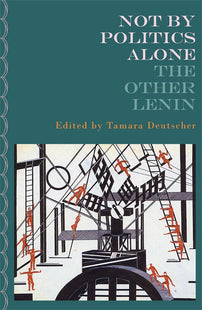Lenin: Geared to One Purpose
In Not By Politics Alone, Tamara Deutscher describes a Lenin whose whole being was geared to one purpose, the purpose of the revolution.

More than any other historical figure, Lenin determined the character and the outlook of our epoch. He developed Marx's conception of proletarian socialism and brought the fabric of his vision within the ken of the exploited and oppressed masses of the vast Tsarist empire. As a leader of men, he gave purpose and direction to social forces which, disjointed and dispersed, might have spent themselves and achieved nothing. He speeded up a historical process, gave it shape and form, and was the prime mover of events which shook the world.
Yet he was no Nietzschean Superman nor a demiurge of history, but was himself shaped and formed by circumstances. His greatness consisted precisely in this: he was the perfect expression of the needs of his time; he saw farther and deeper than most men of his time, and he had an extraordinary insight into those urges and longings of which people, still shackled by an anachronistic mode of existence, had only vague and half-conscious awareness.
He formulated the thoughts which agitated the rank and file of his party; he knew the meaning and weight of the clouds which drifted in the air and across the dark skies of autocratic Russia; he harnessed all the winds of change to unleash the storm in which the old established order of government was to founder. When he acted, he acted in accord with the masses. He was their undisputed leader; he was also led by them.
When on the morrow of the great October insurrection he calmly declared: 'now we shall proceed to build a new social order', in front of him were less than six years during which he exercised power. Behind him was a quarter of a century of prison, exile, clandestine work, and emigration; a quarter of a century of strenuous preparatory and educative endeavour. By 1917 Lenin, the philosopher, theoretician, economist, journalist, polemicist, literary and social critic, had already produced his great works: The Development of Capitalism in Russia, What is to be Done?, and Materialism and Empirio-Criticism.
Just before October, poised on the Finnish border and in hiding, he worked on The State and Revolution which he began with a prophetic remark on the attempts to convert the revolutionary thinkers, after their death, into 'harmless icons', to canonise them, while at the same time robbing their revolutionary theory of its substance. The last chapter of the treatise - on the lessons of 1905 and 1917 - was never written: the actual uprising left no time for this: '... it was more pleasant and useful to go through the "experience of the revolution'' than to write about it', remarked Lenin a few weeks later.
It is not the aim of this volume to introduce the reader to the essentials of Leninism or to summarise or pre-digest for them Lenin's monumental ideas. The other Lenin will emerge: the other and yet the same, the Lenin of everyday reality who lived by politics but not by politics alone, the Lenin of work and leisure, geared to his life's purpose and yet enjoying to the full all the pleasures of a healthy human existence; neither the humourless monolithic cult-hero of the official mythology nor the humourless bogey man of official anti-communism.
What perhaps impressed Trotsky most in Lenin's personality - he stressed this time and time again - was Lenin's singleness of purpose, his extraordinarily tense, unrelenting straining towards his goal: the overthrow of the old autocratic tsarist order and the building up of the foundations of the new, socialist one. Even a less perspicacious observer, and one for whom this tautness of purpose as well as the purpose itself were not matters for admiration, was struck by this characteristic feature: 'The idea which had taken hold of him', writes Valentinov, the future Menshevik who in his youth was under Lenin's spell, 'at any given moment to tally dominates his mind, turning him into a man possessed. It seemed as if all other aspects of his mental life, all his other interests and wishes, were swept aside and vanished during such periods. There was one idea alone, nothing else, in Lenin's field of vision: one brightly shining point in the darkness. The 'one idea' was of such dimensions that it could indeed have filled completely the whole field of vision.
Lenin was not drawn into revolutionary activities on an impulse, by a society in turmoil or on the verge of an upheaval; he chose the life of a professional revolutionary deliberately, after mature reflection, and with eyes fully open. The road dimly perceived by Alexander Ulyanov, his older brother who had perished on the gallows, the road to the transformation of society through society's own awareness of its wretchedness, through the realisation of the masses of their own strength and potentialities acquired in the course of slow educative work, that road became Lenin's long before he glimpsed any hope that in his strivings for his idea, he would ever live to see its fulfilment. Yet, his whole being 'was geared to one purpose', the purpose of the revolution.
This absolute dedication of his life, this subordination of all inessentials to the needs and requirements of the ultimate aim did not, and could not, make of Lenin a wooden icon of Stalinist hagiography nor the soulless, narrow-minded 'compulsive' revolutionary portrayed by Western philistines organically incapable of comprehending the motive power of a truly great idea.
— An edited excerpt from Not By Politics Alone: The Other Lenin by V. I. Lenin, Edited by Tamara Deutscher.
[book-strip index="1" style="buy"]

